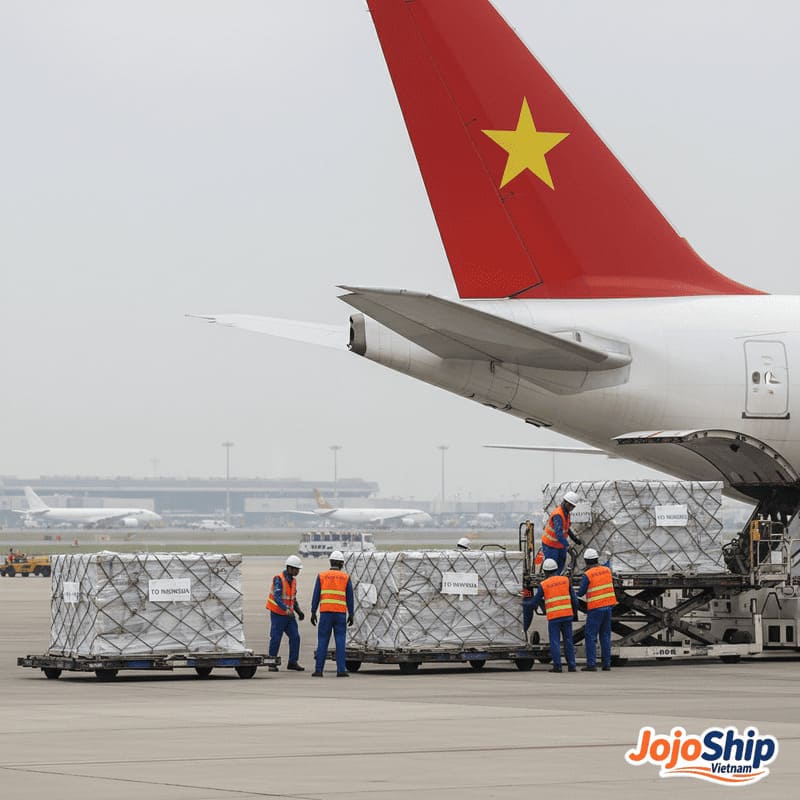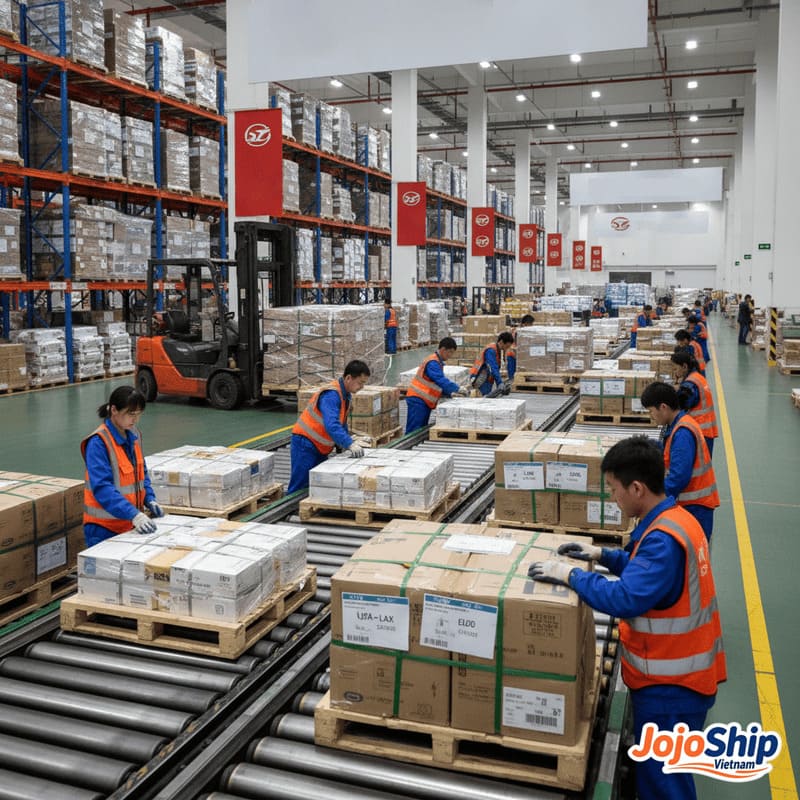Securing reliable air freight quotes from Vietnam to Indonesia can be frustrating and time-consuming. Many businesses struggle with unpredictable rates, hidden fees, and slow response times from forwarders, making it difficult to budget effectively or meet shipping deadlines.
Yes, you can get quotes for air freight forwarding from Vietnam to Indonesia from providers like JojoShip, FNM Vietnam, Haulx Indonesia, Flexport, and DHL. Rates typically range from $3.70-$10.00 per kilogram depending on shipment volume, with transit times of 1-3 days for this Southeast Asian route.

Getting an accurate air freight quote involves more than just finding the lowest rate. Having arranged countless shipments between Vietnam and Indonesia, I've learned that transparency, reliability, and service quality vary dramatically between providers. Let me walk you through what to consider when requesting quotes for this specific trade lane.
What is the cost of air freight per kg?
Many importers are shocked by the wide range of prices quoted for air freight from Vietnam to Indonesia. With rates varying by hundreds of percentage points for seemingly identical services, it's nearly impossible to know if you're getting a fair deal.
The cost of air freight per kg from Vietnam to Indonesia typically ranges from $3.70-$4.00 for shipments over 45kg, $4.50-$6.00 for 21-45kg, and $7.00-$10.00 for smaller shipments under 20kg. Express services cost 30-50% more but offer guaranteed delivery within 1-2 days.

Understanding air freight pricing between Vietnam and Indonesia requires insight into the factors that influence rates. Through years of arranging shipments on this route, I've identified the key elements that determine pricing and how they affect your bottom line.
Vietnam to Indonesia Air Freight Rate Factors
| Weight Break | Standard Air Freight | Express Air Freight | Economy Air Freight | Factors Affecting Rate |
|---|---|---|---|---|
| 1-20kg | $7.00-$10.00/kg | $9.00-$14.00/kg | $5.00-$8.00/kg | Minimum charges apply, less competitive |
| 21-45kg | $4.50-$6.00/kg | $6.00-$8.00/kg | $3.50-$5.00/kg | Better economies of scale |
| 46-100kg | $3.70-$4.50/kg | $5.00-$7.00/kg | $3.00-$4.00/kg | Volume discounts begin |
| 101-300kg | $3.50-$4.00/kg | $4.50-$6.00/kg | $2.80-$3.50/kg | Significant volume discounts |
| 301-500kg | $3.20-$3.80/kg | $4.00-$5.50/kg | $2.60-$3.30/kg | Major volume discounts |
| 500kg+ | $3.00-$3.50/kg | $3.80-$5.00/kg | $2.40-$3.00/kg | Negotiable contract rates |
The volumetric weight calculation1 significantly impacts air freight costs between Vietnam and Indonesia. Most carriers use a 1:6 ratio (1 kg = 6,000 cubic centimeters), meaning that lightweight but bulky items can become surprisingly expensive. For example, I recently helped a client ship fashion accessories from Ho Chi Minh City to Jakarta. While the actual weight was only 100kg, the volumetric weight calculated to 180kg, increasing costs by 80% over their initial expectations.
Seasonal factors create substantial price fluctuations on this route. During peak manufacturing periods (August-October and January-February), rates typically increase by 15-30% due to limited capacity. During Vietnamese holidays like Tet (Lunar New Year), finding any air freight space can be challenging regardless of budget. I advise clients to book at least 7-10 days in advance during normal periods and 14-21 days during peak seasons to secure both capacity and reasonable rates.
Airport selection also impacts pricing. While most quotes reference Ho Chi Minh City (SGN) to Jakarta (CGK), using alternatives like Hanoi (HAN) or Surabaya (SUB) can sometimes yield better rates depending on your origin and final destination. For example, shipments destined for eastern Indonesia often route more efficiently and economically through Surabaya rather than Jakarta, potentially saving 10-15% on total costs.
Fuel surcharges represent another significant but often hidden cost component. These fluctuate monthly based on global oil prices and typically add 15-25% to the base rate. When comparing quotes, I always verify whether fuel surcharges2 are included in the presented rate or will be added separately later. The most transparent forwarders include these in their initial quotes, while others may add them as surprises on final invoices.
How does JojoShip provide air freight quotes from Vietnam to Indonesia?
Finding a responsive freight forwarder who provides accurate, all-inclusive quotes can feel impossible. After waiting days for incomplete information from multiple providers, many businesses waste valuable time comparing quotes that don't reflect final costs.
JojoShip provides comprehensive air freight quotes from Vietnam to Indonesia within 24 hours that include all costs—base rates, fuel surcharges, security fees, and destination charges. Our quotes specify guaranteed transit times, with standard service at $3.50-$4.00 per kg and express options at $5.00-$7.00 per kg.

At JojoShip, we've streamlined the quoting process specifically for the Vietnam-Indonesia corridor based on our extensive experience with this route. Our approach eliminates the confusion and hidden costs that often plague international shipping.
JojoShip Vietnam to Indonesia Air Freight Services
| Service Level | Transit Time | Rate Range (per kg) | Benefits | Best For |
|---|---|---|---|---|
| Economy Air | 3-5 days | $2.80-$3.50 | Cost-effective, reliable | Non-urgent commercial goods |
| Standard Air | 2-3 days | $3.50-$4.00 | Balanced cost/speed | Regular business shipments |
| Express Air | 1-2 days | $5.00-$7.00 | Guaranteed delivery window | Time-sensitive products |
| Next Flight Out | <24 hours | $9.00-$12.00 | Immediate uplift | Critical shipments, samples |
Our quoting process begins with understanding your specific needs. Rather than simply asking for weight and dimensions, we discuss your timeline requirements, product characteristics, and delivery location in Indonesia. This allows us to recommend the most cost-effective service that meets your actual needs rather than defaulting to expensive express options unnecessarily.
For transparent pricing3, our quotes always include:
- Base air freight rate: The fundamental cost of air transportation
- Fuel and security surcharges: Updated weekly to reflect current market rates
- Origin handling: All costs at the Vietnam departure point
- Destination fees: Indonesia arrival charges and handling
- Customs clearance estimates: Based on your specific commodity
- Last-mile delivery options: If door delivery is required
This all-inclusive approach prevents the unpleasant surprises that often occur when businesses receive invoices featuring unexpected charges. I've found that while our initial quote might occasionally appear higher than competitors who exclude certain fees, our final invoices match our quotes, resulting in greater client satisfaction and long-term relationships.
For clients with regular shipments between Vietnam and Indonesia, we offer volume-based contracts4 with guaranteed space allocations even during peak seasons. These agreements typically reduce per-kilogram costs by 10-20% compared to spot quotes and ensure capacity when it's most needed. One electronics components manufacturer saved over $45,000 annually after switching to our contracted service from ad-hoc bookings with multiple forwarders.
Our on-the-ground teams in both Vietnam and Indonesia provide another significant advantage. When customs requirements change (which happens frequently in both countries), we immediately update our procedures and notify clients of new documentation needs. This proactive approach has helped our clients avoid the customs delays that regularly affect less-prepared shipments, sometimes saving 2-3 days in clearance time.
What documentation is needed for air freight from Vietnam to Indonesia?
Preparing proper documentation for Vietnam to Indonesia shipping creates constant confusion. Missing or incorrect paperwork leads to customs delays, additional fees, and frustrated customers waiting for their goods.
Essential documentation for air freight from Vietnam to Indonesia includes commercial invoice, packing list, certificate of origin (Form E for ASEAN preferential duties), air waybill, and insurance certificate. Depending on the product, you may also need permits, quality certificates, or other specialized documents for Indonesian customs.

Navigating documentation requirements for Vietnam-Indonesia shipping requires specialized knowledge of both countries' regulations. Having helped hundreds of clients with this specific route, I've developed a clear understanding of what's needed to ensure smooth clearance.
Documentation Requirements for Vietnam to Indonesia Air Freight
| Document | Purpose | Common Errors | Critical Information |
|---|---|---|---|
| Commercial Invoice | Declares value, buyer/seller | Inconsistent descriptions, missing HS codes | Must include HS codes, complete company details |
| Packing List | Details contents, weights | Inaccurate piece counts, weight discrepancies | Item-by-item breakdown, accurate weights |
| Certificate of Origin (Form E) | Qualifies for ASEAN tariff benefits | Incorrect HS codes, missing stamps | Must be stamped by Vietnam Chamber of Commerce |
| Air Waybill | Transportation contract | Missing notify party, incorrect consignee | Accurate consignee details, delivery instructions |
| Insurance Certificate | Protects against damage/loss | Undervalued coverage, incorrect terms | Sufficient coverage value, accurate cargo description |
| Import License | Required for restricted goods | Missing or expired license | Must be obtained before shipment |
| Product Certifications | Verifies compliance with standards | Incorrect standard references | Specific requirements vary by product type |
Indonesian customs has become increasingly strict about documentation accuracy. The two most critical elements are the HS (Harmonized System) code declarations and valuation documentation. Using incorrect HS codes5 can result in higher duties or outright rejection at the border. I always recommend having a customs specialist verify your classifications specifically for Indonesia, as their interpretations sometimes differ from international standards.
For certain product categories, Indonesia requires additional permits or certifications that must be arranged before shipping. These include:
- Food and beverages: Require registration with Indonesia's Food and Drug Administration (BPOM) and halal certification for many products
- Electronics: Need SNI (Indonesian National Standard) certification
- Textiles and garments: Require specific labeling and sometimes import permits
- Cosmetics: Must be registered with BPOM with compliant labeling
Preparing these specialized documents can take weeks or even months, so planning well in advance is essential. I've helped clients navigate these requirements by connecting them with certification agents in Indonesia who can manage the process while shipments are still in production in Vietnam.
The Certificate of Origin (Form E) deserves special attention for Vietnam-Indonesia trade. This document qualifies goods for reduced or eliminated duties under the ASEAN Trade in Goods Agreement6 (ATIGA). To be valid, it must be properly completed with exact product descriptions matching the commercial invoice7 and stamped by the Vietnam Chamber of Commerce. The potential savings are substantial—often reducing duties from 10-20% to zero—making this document well worth the effort to secure correctly.
For businesses new to Vietnam-Indonesia shipping, I recommend working with a forwarder experienced in this specific trade lane who can provide documentation templates and guidance. The right partner can dramatically reduce clearance times through proper preparation. Our clients typically see their goods clear Indonesian customs in 1-2 days compared to the 3-7 days often experienced by those with documentation issues.
Are there special requirements for Indonesian customs clearance?
Many shippers are surprised by unexpected delays at Indonesian customs8. Even with seemingly complete documentation, shipments can be held for days or weeks due to specific Indonesian requirements that weren't properly addressed.
Indonesian customs requires several special procedures including pre-arrival notification through Indonesia's National Single Window system, accurate HS code classification, proper licenses for restricted items, and LARTAS (restriction clearance) verification. Products like electronics, textiles, food, and cosmetics need specific permits and testing certifications.

Successfully navigating Indonesian customs8 clearance requires understanding the country's unique processes and requirements. After years of managing air freight shipments into Indonesia from Vietnam, I've identified the key elements that ensure smooth entry.
Indonesian Customs Clearance Requirements
| Requirement | Description | Preparation Time | Impact if Missing |
|---|---|---|---|
| Indonesia National Single Window (INSW) | Electronic pre-notification system | 1-2 days before arrival | Shipment delays of 2+ days |
| Import License9 (API/APIS) | General or specific import permit | 30-60 days to obtain | Cannot clear customs |
| HS Code Verification | Pre-clearance approval of classifications | 1-3 days | Potential reclassification and higher duties |
| LARTAS Clearance | Verification of compliance with restrictions | 1-7 days depending on product | Shipment rejection or extended inspection |
| SNI Certification10 | Indonesian National Standard compliance | 30-90 days | Products can be rejected or destroyed |
| BPOM Registration11 | Food/drug/cosmetic product registration | 60-180 days | Products cannot be imported |
| Importer of Record | Legal entity responsible for import | Must be established before shipping | Shipment cannot be processed |
Indonesia's customs system operates differently from many other countries, with several unique procedures that catch unprepared shippers by surprise. One of the most significant is the "red line" vs. "green line" inspection system. New importers or those shipping certain product categories are automatically placed in the "red line," meaning physical inspection of every shipment. This can add 3-7 days to clearance times and often results in additional fees.
To improve your chances of "green line" (document-only review) status, working with an experienced Indonesian customs8s broker](https://www.haocargo.com/the-importance-of-a-good-customs-broker-in-indonesia-for-smooth-cross)[^12] is essential. At JojoShip, we partner with specialized brokers in Jakarta, Surabaya, and other major entry points who maintain strong relationships with customs officials and understand how to properly prepare documentation to minimize inspection likelihood.
The Indonesian National Single Window (INSW) system requires advance submission of shipping documentation—ideally 2 days before arrival for air freight. This pre-arrival processing can significantly reduce clearance times upon actual arrival. I've found that shippers who submit complete, accurate documentation through INSW typically clear customs 1-3 days faster than those who wait until after arrival.
Import licensing represents another major hurdle. Indonesia requires importers to have either a general import license (API-U for traders) or a producer import license (API-P for manufacturers). Without the appropriate license, goods cannot legally enter Indonesia. For certain regulated products, additional specific import permits (SPI) are required. These can take weeks or months to obtain, so planning well in advance is critical.
Product testing and certification requirements are particularly strict in Indonesia. The SNI (Indonesian National Standard) certification program covers numerous product categories including electronics, toys, textiles, and household goods. Obtaining these certifications involves product testing at approved laboratories and can take 2-3 months. I always advise clients to begin this process early in their product development cycle rather than waiting until shipping time.
Conclusion
You can easily get air freight quotes from Vietnam to Indonesia through providers like JojoShip, FNM Vietnam, Haulx Indonesia, and Flexport, with rates typically ranging from $3.70-$10.00 per kilogram. For the best service, choose a forwarder with experience in both countries who can navigate documentation requirements and customs clearance efficiently, ensuring your shipments arrive within the standard 1-3 day transit time.
-
Learn how volumetric weight affects shipping costs to avoid unexpected charges. ↩
-
Understanding fuel surcharges can help you compare quotes accurately and avoid hidden fees. ↩
-
Understanding transparent pricing is crucial for avoiding unexpected charges in your shipping costs. ↩
-
Learn how volume-based contracts can save you money and ensure capacity during peak shipping seasons. ↩
-
Learn about HS codes and their critical role in determining duties and ensuring smooth customs clearance. ↩
-
Discover how the ASEAN Trade in Goods Agreement can reduce tariffs and facilitate trade between member countries. ↩
-
Understanding the commercial invoice is crucial for accurate customs declarations and avoiding delays. ↩
-
Understanding Indonesian customs is crucial for smooth shipping and avoiding delays. ↩ ↩ ↩
-
Knowing the right Import License can save you time and prevent customs issues. ↩
-
SNI Certification is vital for compliance; learn how to obtain it to avoid product rejection. ↩
-
BPOM Registration is essential for importing food and cosmetics; ensure your products meet regulations. ↩




